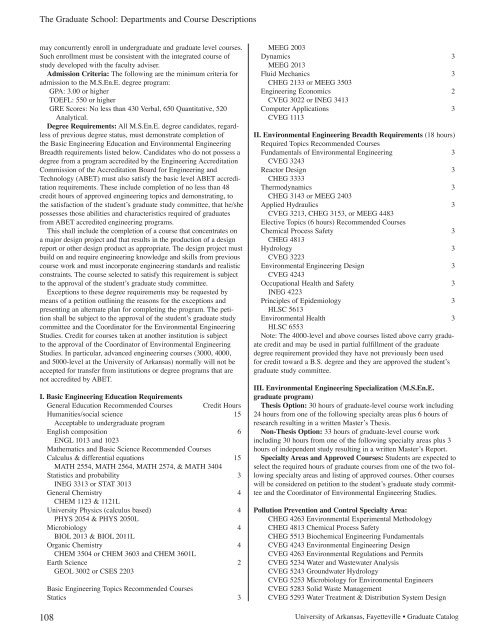Graduate School - Catalog of Studies - University of Arkansas
Graduate School - Catalog of Studies - University of Arkansas
Graduate School - Catalog of Studies - University of Arkansas
Create successful ePaper yourself
Turn your PDF publications into a flip-book with our unique Google optimized e-Paper software.
The <strong>Graduate</strong> <strong>School</strong>: Departments and Course Descriptions<br />
may concurrently enroll in undergraduate and graduate level courses.<br />
Such enrollment must be consistent with the integrated course <strong>of</strong><br />
study developed with the faculty adviser.<br />
Admission Criteria: The following are the minimum criteria for<br />
admission to the M.S.En.E. degree program:<br />
GPA: 3.00 or higher<br />
TOEFL: 550 or higher<br />
GRE Scores: No less than 430 Verbal, 650 Quantitative, 520<br />
Analytical.<br />
Degree Requirements: All M.S.En.E. degree candidates, regardless<br />
<strong>of</strong> previous degree status, must demonstrate completion <strong>of</strong><br />
the Basic Engineering Education and Environmental Engineering<br />
Breadth requirements listed below. Candidates who do not possess a<br />
degree from a program accredited by the Engineering Accreditation<br />
Commission <strong>of</strong> the Accreditation Board for Engineering and<br />
Technology (ABET) must also satisfy the basic level ABET accreditation<br />
requirements. These include completion <strong>of</strong> no less than 48<br />
credit hours <strong>of</strong> approved engineering topics and demonstrating, to<br />
the satisfaction <strong>of</strong> the student’s graduate study committee, that he/she<br />
possesses those abilities and characteristics required <strong>of</strong> graduates<br />
from ABET accredited engineering programs.<br />
This shall include the completion <strong>of</strong> a course that concentrates on<br />
a major design project and that results in the production <strong>of</strong> a design<br />
report or other design product as appropriate. The design project must<br />
build on and require engineering knowledge and skills from previous<br />
course work and must incorporate engineering standards and realistic<br />
constraints. The course selected to satisfy this requirement is subject<br />
to the approval <strong>of</strong> the student’s graduate study committee.<br />
Exceptions to these degree requirements may be requested by<br />
means <strong>of</strong> a petition outlining the reasons for the exceptions and<br />
presenting an alternate plan for completing the program. The petition<br />
shall be subject to the approval <strong>of</strong> the student’s graduate study<br />
committee and the Coordinator for the Environmental Engineering<br />
<strong>Studies</strong>. Credit for courses taken at another institution is subject<br />
to the approval <strong>of</strong> the Coordinator <strong>of</strong> Environmental Engineering<br />
<strong>Studies</strong>. In particular, advanced engineering courses (3000, 4000,<br />
and 5000-level at the <strong>University</strong> <strong>of</strong> <strong>Arkansas</strong>) normally will not be<br />
accepted for transfer from institutions or degree programs that are<br />
not accredited by ABET.<br />
I. Basic Engineering Education Requirements<br />
General Education Recommended Courses Credit Hours<br />
Humanities/social science 15<br />
Acceptable to undergraduate program<br />
English composition 6<br />
ENGL 1013 and 1023<br />
Mathematics and Basic Science Recommended Courses<br />
Calculus & differential equations 15<br />
MATH 2554, MATH 2564, MATH 2574, & MATH 3404<br />
Statistics and probability 3<br />
INEG 3313 or STAT 3013<br />
General Chemistry 4<br />
CHEM 1123 & 1121L<br />
<strong>University</strong> Physics (calculus based) 4<br />
PHYS 2054 & PHYS 2050L<br />
Microbiology 4<br />
BIOL 2013 & BIOL 2011L<br />
Organic Chemistry 4<br />
CHEM 3504 or CHEM 3603 and CHEM 3601L<br />
Earth Science 2<br />
GEOL 3002 or CSES 2203<br />
Basic Engineering Topics Recommended Courses<br />
Statics 3<br />
108<br />
MEEG 2003<br />
Dynamics 3<br />
MEEG 2013<br />
Fluid Mechanics 3<br />
CHEG 2133 or MEEG 3503<br />
Engineering Economics 2<br />
CVEG 3022 or INEG 3413<br />
Computer Applications 3<br />
CVEG 1113<br />
II. Environmental Engineering Breadth Requirements (18 hours)<br />
Required Topics Recommended Courses<br />
Fundamentals <strong>of</strong> Environmental Engineering 3<br />
CVEG 3243<br />
Reactor Design 3<br />
CHEG 3333<br />
Thermodynamics 3<br />
CHEG 3143 or MEEG 2403<br />
Applied Hydraulics 3<br />
CVEG 3213, CHEG 3153, or MEEG 4483<br />
Elective Topics (6 hours) Recommended Courses<br />
Chemical Process Safety 3<br />
CHEG 4813<br />
Hydrology 3<br />
CVEG 3223<br />
Environmental Engineering Design 3<br />
CVEG 4243<br />
Occupational Health and Safety 3<br />
INEG 4223<br />
Principles <strong>of</strong> Epidemiology 3<br />
HLSC 5613<br />
Environmental Health 3<br />
HLSC 6553<br />
Note: The 4000-level and above courses listed above carry graduate<br />
credit and may be used in partial fulfillment <strong>of</strong> the graduate<br />
degree requirement provided they have not previously been used<br />
for credit toward a B.S. degree and they are approved the student’s<br />
graduate study committee.<br />
III. Environmental Engineering Specialization (M.S.En.E.<br />
graduate program)<br />
Thesis Option: 30 hours <strong>of</strong> graduate-level course work including<br />
24 hours from one <strong>of</strong> the following specialty areas plus 6 hours <strong>of</strong><br />
research resulting in a written Master’s Thesis.<br />
Non-Thesis Option: 33 hours <strong>of</strong> graduate-level course work<br />
including 30 hours from one <strong>of</strong> the following specialty areas plus 3<br />
hours <strong>of</strong> independent study resulting in a written Master’s Report.<br />
Specialty Areas and Approved Courses: Students are expected to<br />
select the required hours <strong>of</strong> graduate courses from one <strong>of</strong> the two following<br />
specialty areas and listing <strong>of</strong> approved courses. Other courses<br />
will be considered on petition to the student’s graduate study committee<br />
and the Coordinator <strong>of</strong> Environmental Engineering <strong>Studies</strong>.<br />
Pollution Prevention and Control Specialty Area:<br />
CHEG 4263 Environmental Experimental Methodology<br />
CHEG 4813 Chemical Process Safety<br />
CHEG 5513 Biochemical Engineering Fundamentals<br />
CVEG 4243 Environmental Engineering Design<br />
CVEG 4263 Environmental Regulations and Permits<br />
CVEG 5234 Water and Wastewater Analysis<br />
CVEG 5243 Groundwater Hydrology<br />
CVEG 5253 Microbiology for Environmental Engineers<br />
CVEG 5283 Solid Waste Management<br />
CVEG 5293 Water Treatment & Distribution System Design<br />
<strong>University</strong> <strong>of</strong> <strong>Arkansas</strong>, Fayetteville • <strong>Graduate</strong> <strong>Catalog</strong>












